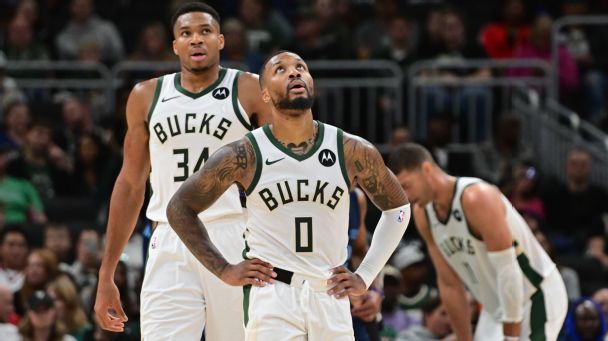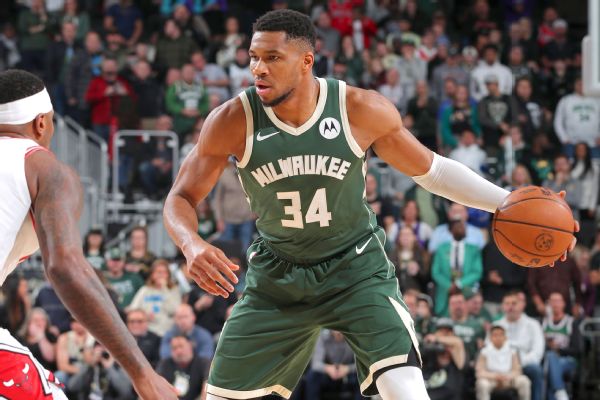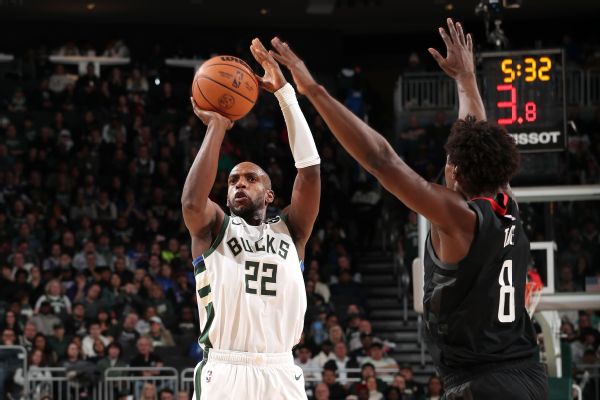LONG BEFORE GAME 6 and quite possibly the best 50-piece chicken nugget celebration in recorded history, before his dad jokes became a bobblehead and his life story became a feature film, Giannis Antetokounmpo placed a call on his drive home from work that would change the NBA.
For months, he had agonized over whether to extend his contract and commit the next five years of his life and career to the Milwaukee Bucks. A dispiriting second-round playoff loss to the Miami Heat in September 2020 had left a bad taste in everyone’s mouth after the Bucks had amassed the best record in the league and Antetokounmpo had won a second straight MVP award.
“That summer, I was calling people that were in my position in the past,” Antetokounmpo tells ESPN. “I was like, ‘What do I do? Do you stay? Do you not stay? Do you stay? Do you not stay?’ And everybody was basically telling me not to stay.”
Four weeks earlier, the Bucks had traded three future first-round draft picks to the New Orleans Pelicans for Jrue Holiday. Still, they’d need to break through in an Eastern Conference loaded with potential superteams in the Brooklyn Nets, Philadelphia 76ers and Boston Celtics.
“But,” Antetokounmpo continues, “my gut said, ‘No. I’m here. They gave me an opportunity. They changed my life. I’m here.’ And when I was driving back to my house, I called the GM [Jon Horst] and told him, ‘I’m signing.'”
Horst remembers the call on Dec. 15, 2020, like it was yesterday. “It’s one of the greatest memories and moments of my life so far,” he says.
Within minutes, word spread across Milwaukee.
“Then all of a sudden,” Antetokounmpo says, “everybody went downtown, I signed the contract and I said, ‘We’re going to win.'”
What came next is NBA history. Antetokounmpo made good on his promise, and the Bucks won the 2021 NBA championship behind one of the all-time great individual performances — his 50 points in the series-clinching 105-98 victory in that Game 6 against the Phoenix Suns.
It was a validation of his faith in the organization and its faith in him, a small-market success story that resonated throughout the sports world.
And it bought them exactly two years of peace.
Because this offseason, as the Bucks tried to recover from an even more disappointing first-round loss to the Heat, Antetokounmpo was approaching another big contract decision. Starting Sept. 22, he was eligible to sign a three-year extension worth approximately $169 million. He also had a $51.9 million player option for the 2025-26 season, giving him the option to become a free agent as early as the summer of 2025.
Could the Bucks retain the key players from their championship core — free agents Brook Lopez and Khris Middleton — at rates that wouldn’t hamstring them under the new collective bargaining agreement? If so, was that even the best way to stay in contention given Lopez’s age (35) and Middleton’s injury history?
Was there a different way to get Antetokounmpo meaningful offensive help, given the Bucks’ diminished war chest of draft picks? They’d already ranked 27th in future draft assets, according to ESPN Stats & Information.
The temperature was rising. Rival superstars had begun reaching out to Antetokounmpo, pitching new collaborations, league sources told ESPN. Rival teams had already begun planning for a potential bidding war, league sources told ESPN, should Antetokounmpo ever become available.
Then, in late August, a relative bombshell: Antetokounmpo telling the New York Times, “I would not be the best version of myself if I don’t know that everybody’s on the same page, everybody’s going for a championship … and if I don’t feel that, I’m not signing.”
Though he had expressed similar sentiments before, the reaction around the league was seismic.
“Two years ago when I said the same thing, nobody talked about it because they knew that I was here for the next five years,” Antetokounmpo says. “It’s something I’m going to say until I retire — and expect for myself until I leave this earth. I always expect to do the best that I can do. I expect to win. I don’t want to be in a place that I don’t have a chance to win. And sorry if people feel the wrong way about that; that’s on them.”
Horst was having breakfast at the team’s training facility when he saw the news.
“I read the headline and just said to [Bucks longtime public relations maven Barry Baum], ‘Just send me the quotes,'” Horst says. “He sent me the quotes, and I’m like, ‘There’s nothing to worry about.'”
Little did anyone outside of the very inner sanctums of the Bucks’ or Portland Trail Blazers’ front offices know then, but help was already on the way. And it would come in the form of an NBA superstar who had been unsuccessfully trying for the better part of two years to pressure his own franchise into taking a high-stakes gamble — just like this.
“Because if you’re being honest” Horst says now, “with Giannis, you’re kind of always on the clock.”
DAMIAN LILLARD HAD just settled into an oversize chair inside his newly completed 25,000-square-foot mansion in Tualatin, Oregon.
He had been building this house since 2020 — and planned for it to be his forever home, finally moving in over the summer, ironically around the same time he’d finally asked the Trail Blazers to trade him to a championship contender.
All summer, he had waited for resolution. Each week it didn’t happen, more questions arose.
“In the beginning, I thought it would happen faster,” Lillard tells ESPN. “But as it got later, it just became a little bit more stressful than I would’ve liked.” As training camp approached and no trade seemed imminent, Lillard returned to the Trail Blazers’ facility. He says he told the team he was willing to play if they couldn’t move him by the start of camp.
The Trail Blazers said very little back — to Lillard or to anyone else in the league. Portland general manager Joe Cronin believed secrecy was of the utmost importance in completing the best deal for his franchise.
On the morning of Sept. 27, Cronin finally had one.
“I was literally sitting down in my man cave, thinking I’m going to be in Portland until the [trade] deadline [in February], when I got on Instagram,” Lillard recalls. He’d been binge-watching ” Power Book II: Ghost,” the sequel to the hit Starz show, “Power,” and was planning to watch another episode when he opened up his phone.
“There was a picture of me and Giannis on a boxing page I follow called Champ Side,” he says. “I thought it was speculation.”
Before Lillard could read the photo caption, his phone rang. It was his agent, Aaron Goodwin, telling him he had been traded to the Bucks. About a week earlier, Lillard and Goodwin had discussed teams besides the Heat that Lillard would be open to — since conversations with Miami had for months been unproductive — and he had warmed to the idea of playing with Antetokounmpo in Milwaukee, sources told ESPN. But it was just an idea, very quietly discussed and passed along.
“Boom! Just like that,” he says. “Then as I was talking to AG, I saw I had a text from Joe saying, ‘Just tried you.’
“I guess he tried to call me, but I didn’t see it. Honestly, I didn’t even look to see if he called me after that. It was done. I was just like, ‘Whatever.’
“I had to move on.”
The next few hours were a blur. Lillard spoke to Horst and the rest of the Bucks’ front office, to his mother, father and brother, then to Antetokounmpo. Lillard got acquainted with the Bucks’ roster, pieced together who was still there after the trade and began wrapping his head around the idea of reporting to training camp in Milwaukee within the next 72 hours.
“Honestly, I had to sit down for a little bit,” Lillard says.
Two years earlier, Lillard had sent messages to his organization — asking for help by emphasizing his desire to win — similar to that of the message Antetokounmpo had delivered to the Bucks via the New York Times in August.
Portland had explored various trades — most recently for the Toronto Raptors’ O.G. Anunoby, according to league sources — but never landed anyone who would elevate it to contender stature. Instead, in a final twist of irony, Lillard became the answer to Antetokounmpo’s pleas.
Present this idea to Lillard and he shrugs, then mentions two lesser-known players the Blazers acquired who aren’t with Portland anymore.
He has moved on.
“There’s a lot of people there — including [Blazers coach] Chauncey [Billups] — I still have a lot of love for,” Lillard says. “I just feel like it had run its course. I hate the way that it went and how it became a public thing the way it did, but it is what it is. I made peace with it, and I don’t walk away from it with any hard feelings. I don’t think all of the relationships will be the same, but I don’t have hard feelings toward anybody.”
ANTETOKOUNMPO WANTED TO know two things when the Bucks told him they were acquiring Lillard:
1. How in the hell they’d managed to keep their discussions so quiet.
2. When Lillard was arriving.
“I went and drove down to the practice facility so we could talk,” Antetokounmpo says. “He didn’t know that I knew he was coming in.”
From a basketball perspective, the fit was obvious. But Antetokounmpo wanted to make sure Lillard felt welcomed on a human level too.
“Basketball, we’re going to figure it out. Every day that we play together, we’ll figure it out,” Antetokounmpo says. “But off the court, it’s very important also for him to feel as comfortable as possible, because I know if you feel comfortable as a family man, you’re going to be able to do his job with no distractions, the same way as me.”
The answer to Antetokounmpo’s first question was more complicated.
“Giannis was like, ‘How did you tell not one person? How did this not get leaked?'” Bucks vice president of global scouting Ryan Hoover tells ESPN. “And I looked at him and said, ‘Giannis, it was the same way when we drafted you.’ We keep our mouth shut.”
Hoover can smile now that Lillard is in Milwaukee. But for months — no, years — he has had to suppress any expression of how badly he and the organization have wanted to pair Lillard with Antetokounmpo.
“It was just something on my heart and on my mind for many, many years,” Hoover says. “To take it to that next level, to sustain success at a high level, Dame Lillard was the guy.”
Hoover had loved Lillard’s game since Jan. 11, 2013, when the rookie guard dumped 37 on the Golden State Warriors. Hoover had even called Billups, then a guard with the LA Clippers, after that game and said, “I think I just found your little brother.”
A few times a year since, Hoover would raise the issue with Horst, who would dutifully make a call to the Blazers, express interest and get turned down.
“Yeah,” Hoover says with a smile, “sometimes you have to speak things into existence.”
In the fall of 2021, just a few months after Milwaukee had won the championship, Hoover even tried to sing it into existence. The Bucks were having a staff retreat in Kohler, Wisconsin, at a golf course about an hour’s drive north of Milwaukee, and the first session of the morning was devoted to “big ideas.”
Hoover was the first to present. Inside the room, he pushed play on his laptop, filling the room with one of the songs from Lillard’s latest album. He walked up to the front of the hall, wrote “DAME!!!” on the whiteboard and walked back to his seat.
“I just wanted us to understand that to continue to win and put banners up, we had to think big,” Hoover says. “Jon challenges us to think big, be creative and think outside the box. If there’s a will, there’s a way.”
Even if it takes two years for that way to present itself.
“You stay in the barbershop long enough,” Hoover says, “you get a haircut.”
THE FULL RAMIFICATIONS of the Bucks trade for Lillard won’t be understood for months, maybe even years. The team does not control its own first-round pick until 2032. They have just two second-round picks in that same span.
But the immediate ramifications came fully into focus within three weeks.
That came on Monday, when Antetokounmpo announced he was signing a three-year, $186 million extension
Each time, Antetokounmpo spoke of loyalty as his main motivation.
“The Milwaukee Bucks organization, they’ve been there with me since the beginning. They changed my life. They changed my family’s life,” he said Tuesday.
“The city shows me a lot of love. And also whenever I go out there and have time with my family, they also give me space. When they see me on the street, they give me space. They respect me, who I am as a person, what I’ve done for the city of Milwaukee. And for that, I can’t turn my back. Not now, not in the future, not never. I want to be committed. I want to give back to the city of Milwaukee. We won one championship, but I believe that we can win a second one.”
Horst says the call he got from Antetokounmpo expressing plans to re-sign was even better than the one he received in 2020.
Because this time, Antetokounmpo was not expected to sign the extension. From a financial perspective, waiting a year would have allowed him to sign for an extra year and $65 million.
“Money is not important, but a lot of f—ing money is important,” Antetokounmpo said on media day on Oct. 2. “So I’m going to sign it next year. It doesn’t make sense right now.”
That didn’t stop the Bucks from trying. Horst flew to Houston, where Antetokounmpo was training with Hakeem Olajuwon, to present him with an official offer the very first day Horst was allowed to.
“I think those things matter,” Horst says.
Then late last Thursday, Horst called Antetokounmpo and his agent, Alex Saratsis, and asked them to take a look at a 20-page proposal that presented a different way of looking at the situation. Horst had asked two basketball operations staffers — Arjun Mahendroo and Lindsay Hay — to team up with the marketing department to lay out the presentation.
It was long and personal, but the business side of it was succinct: Signing a three-year extension now would give Antetokounmpo two more chances to sign maximum extensions before the age-38 rule of the NBA’s collective bargaining agreement kicked in.
That idea resonated.
“When we took the long-term view of how this decision gave him the best ability to maximize earnings over the next 10 years, it began to make more sense,” Saratsis tells ESPN.
“Other than the ego of signing the largest contract in NBA history in the short term, why not take three big bites at the apple instead of two?”
Signing a three-year extension now, the thinking went, also would give the Bucks stability.
Horst had two of his most trusted interns drive the Bucks’ pitch to Saratsis in Chicago on Thursday night. The GM also sent a bottle of small-batch Barrell Craft Spirits Bourbon — the same he had sent three years earlier when Antetokounmpo decided to re-sign.
On Sunday, Horst drove from Milwaukee to Chicago to meet Saratsis at a cafe called Hexe Coffee Co. to talk it through in person. After hearing the pitch, Saratsis got on the phone with Antetokounmpo while the GM waited for nearly 30 minutes. The conversations were productive, Saratsis says, but Antetokounmpo wanted to sleep on it and talk with his family before making a final decision.
“I knew in my heart that I wanted to stay here,” Antetokounmpo said Tuesday afternoon. “I don’t want people to turn around when we lose a game and say, ‘Giannis is irritated, Giannis doesn’t like what’s going on, Giannis is going to leave.’ No. The conversation right now is going to be basketball.
“How can we get better? How do we build good habits? I did it this way before, in 2020, and it was good for me because I didn’t have to think about it. I didn’t have to put myself in a state of, ‘What if? What if?’ No, I’m committed. I’m here. And I want to win another championship.”


